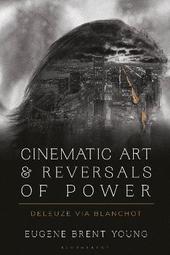
|
Cinematic Art and Reversals of Power: Deleuze via Blanchot
Hardback
Main Details
| Title |
Cinematic Art and Reversals of Power: Deleuze via Blanchot
|
| Authors and Contributors |
By (author) Eugene B. Young
|
| Physical Properties |
| Format:Hardback | | Pages:344 | | Dimensions(mm): Height 234,Width 156 |
|
| Category/Genre | Theory of art
Film theory and criticism
Literary theory
Social and political philosophy |
|---|
| ISBN/Barcode |
9781350176096
|
| Classifications | Dewey:791.4301 |
|---|
| Audience | | Tertiary Education (US: College) | | Professional & Vocational | |
|---|
|
Publishing Details |
| Publisher |
Bloomsbury Publishing PLC
|
| Imprint |
Bloomsbury Academic
|
| Publication Date |
10 February 2022 |
| Publication Country |
United Kingdom
|
Description
Bringing together Deleuze, Blanchot, and Foucault, this book provides a detailed and original exploration of the ideas that influenced Deleuze's thought leading up to and throughout his cinema volumes and, as a result, proposes a new definition of art. Examining Blanchot's suggestion that art and dream are "outside" of power, as imagination has neither reality nor truth, and Foucault's theory that power forms knowledge by valuing life, Eugene Brent Young relates these to both Deleuze's philosophy of time and his work with Guattari on art. In doing so, he uses case studies from literature and popular film, including Kafka's Castle, Villeneuve's Arrival, and Kubrick's Eyes Wide Shut. Providing important new insights for those working in literary and cinematic studies, this book advances a new definition of art as that which reverses the realities and truths of power to express obscure ideas and values beyond both our exterior and interior worlds.
Author Biography
Eugene B. Young is Professor of Practice in Philosophy and English at Le Moyne College, Syracuse, USA. He is the primary author and editor of The Deleuze and Guattari Dictionary (Bloomsbury, 2013).
ReviewsYoung uses the work of Deleuze and Blanchot to offer a new theory of literature and cinema, one that removes us from the political snares of our current situation to an outside that is not just another trap. His book is a deep read and an original contribution. * Todd May, Class of 1941 Memorial Professor of the Humanities, Clemson University, USA * If you have thought, as I have, that Blanchot is the key to understanding Deleuze, then you must read this book. There is no other that better explains the importance of Blanchot to appreciate Deleuze's interpretation of art, literature, and cinema, whose aim is to make us believe in the world again beyond the limited possibilities given to us by power. * William Large, Associate Professor in Continental Philosophy, University of Gloucestershire, UK *
|